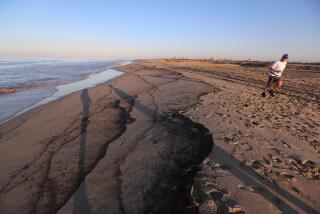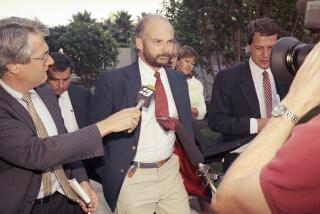Conoco Says It Will Order Oil Tankers With Double Hulls
HOUSTON — Conoco Inc., one of the nation’s major oil companies, said Tuesday that it was ordering two double-hull oil tankers as part of a measure designed to guard against spills like last year’s wreck of the Exxon Valdez off Alaska.
Oil companies have faced increasing pressure from politicians and environmentalists to switch to double-hull tankers since the Exxon Valdez ran aground, gushing nearly 11 million gallons of crude into Prince William Sound in the nation’s worst spill.
Many oil industry officials have argued against twin-hull vessels, however, claiming that they could be less stable than conventional tankers if their outer hull is pierced.
The oil industry’s American Petroleum Institute in Washington said it knew of no other U.S. oil company requiring doubled-hulled tankers, although some have such vessels in operation.
Exxon Corp. President Lee Raymond said last month that the company had made no decision on requiring double-hulled tankers but noted that it probably would not build any new tankers for a couple of years. Raymond said Exxon was awaiting the completion of a study on double-hulled vessels by the National Academy of Engineering.
James H. Ross, president and chief executive of BP America, said that recent oil spills have taught the industry some lessons but the need for double hulls is not one and that there can be no guarantees against future spills.
However, he conceded that double hulls are the wave of the future.
“We are going to have double hulls of some sort,” Ross predicted, “and I think the only question remaining is to make sure that is done in the most sensible cost effective way.”
BP America was involved in the spill of 400,000 gallons of Alaska crude at Huntington Beach on Feb. 7, when the tanker American Trader suffered puncture wounds.
Although authorities believe that the tanker’s own anchor acted like a battering ram smashing into the tanker, Ross said double hulls were not necessarily the way to prevent spills.
Conoco said it would order only double-hull tankers in the future and had placed an order for two such vessels.
The step was part of environmental program Conoco unveiled that also included efforts to reduce toxic air emissions.
“We are in the business by the public’s consent,” said Constantine S. Nicandros, Conoco president and chief executive. “We are sincere in our concern for the air, water and land of our planet as a matter of enlightened self-interest.”
More to Read
Inside the business of entertainment
The Wide Shot brings you news, analysis and insights on everything from streaming wars to production — and what it all means for the future.
You may occasionally receive promotional content from the Los Angeles Times.










